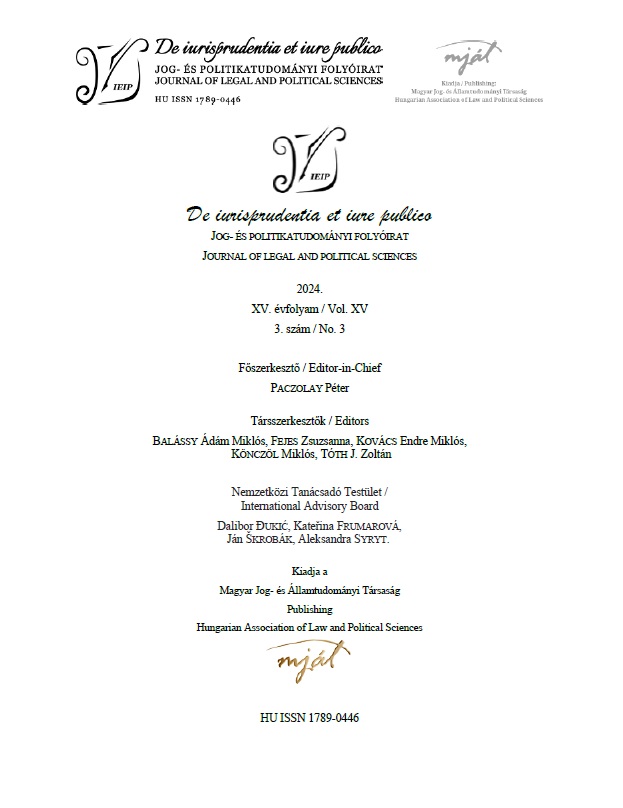DIEIP 2024. XV. évfolyam / Vol. XV. 3. szám / No. 3.
Articles
Abstract
The legal status and classification of parliamentary resolutions in Hungary, particularly those issued by the National Assembly, are complex and multifaceted. This text explores the distinction between internal and external resolutions, highlighting the unique nature of Standing Orders and their role in parliamentary practice. It discusses how these resolutions, while not always classified as formal legal norms, can still exert binding authority within the framework of parliamentary procedures. The text explores into the normative and individual nature of resolutions, explaining how their application depends on whether they regulate internal parliamentary operations or address external entities.
The requirement of legality in parliamentary procedures is emphasized, pointing to the need for state bodies to adhere to prescribed forms and maintain consistency to ensure legal certainty. The paper further examines the difficulty of categorizing parliamentary resolutions as legal sources, and the challenges of distinguishing between normative and individual acts.
Keywords: Parliamentary resolutions, Standing Orders, National Assembly, internal resolutions, external resolutions, legality, legal norms, political declarations
Abstract
This paper provides an in-depth analysis of the legal frameworks governing the relationship between the European Union and the countries of Central Asia. Since the collapse of the Soviet Union, Central Asia has emerged as a region of strategic importance due to its geopolitical location, abundant energy resources, and potential for economic cooperation. The EU’s engagement with Central Asia has evolved over the past three decades, characterized by the establishment of bilateral agreements and the adoption of strategic approaches toward the region. The legal foundation of the EU’s relations with individual Central Asian countries includes Partnership and Cooperation Agreements and Enhanced Partnership and Cooperation Agreements, which cover a wide range of areas such as trade, investment, and human rights. Additionally, the EU has implemented various strategies aimed at enhancing cooperation with Central Asian countries, focusing on areas such as economic development, energy, environmental sustainability, and security. The paper conducts an analysis of the agreements signed between the EU and Central Asian countries, as well as the strategies adopted by the EU towards Central Asia.
Keywords: EU, Central Asia, legal frameworks, PCA, EPCA, Strategy
Abstract
This paper investigates the complexities of e-governance implementation, emphasizing the importance of user awareness as a fundamental step. E-governance in the public sector, particularly in health services, is facing challenges in Ethiopia. The effectiveness of e-governance is debatable, but it leverages technology to improve citizens’ lives and enhance interaction between governments and the public through initiatives like WoredaNet and HealthNet. The study identifies obstacles to e-health strategy success, including institutional gaps, digital disparities, privacy concerns, and cultural barriers. Discrepancies between data system implementation expectations and reality are the primary cause of e-government project failure in developing nations. To address these challenges, it is crucial to establish clear mandates, responsibilities, and coordination across government entities. It advocates for a robust institutional framework, enhanced ICT access, service continuity, and IT education to support effective e-governance and digital healthcare implementation.
Keywords: e-governance, public administration, public sector, health services, Ethiopia
Abstract
Present paper attempts to conduct a thorough examination concerning the issue of civil death, that can be classified within the category of moral punishments. The category of moral punishments is a complex area that requires not only an understanding of legal systems but also a comprehensive grasp of moral norms and societal expectations. Civil death as a punishment raises extremely serious legal and moral dilemmas that can extend from human rights to punitive objectives to international law. The aim of the study is to outline the category of moral punishments, attempt to define and interpret civil death as a punishment, and contemplate the relevant elements of the current Hungarian regulation on this topic, mainly in terms of punitive objectives and certain forms of restrictive and deprivation sanctions. Furthermore, the study aims to provide a historical overview of the development and application of civil death as a punishment, considering its legal and societal context. The analysis also seeks to assess how these aspects continue to shape contemporary attitudes towards civil death and its potential implications for modern legal systems.
Keywords: moral penalties, civil death, punishment objectives, mort civile, attainder

